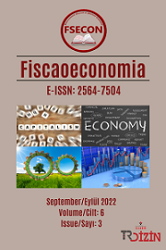Türkiye Ekonomisi İçin Genişletilmiş Taylor Kuralı Analizi: ARDL Sınır Testi
Augmented Taylor Rule Analysis for Turkish Economy: ARDL Bound Test
Author(s): Erol Bulut, İbrahim TokatlıoğluSubject(s): National Economy, Economic history, International relations/trade, Transformation Period (1990 - 2010), Present Times (2010 - today), Financial Markets, Fiscal Politics / Budgeting
Published by: Ahmet Arif Eren
Keywords: Augmented Taylor Rule; Inflation Targeting; ARDL Bound Test;
Summary/Abstract: Inflation targeting is one of the most preferred policies in the fight against inflation. One of the most popular tools of this policy is the nominal interest rate. One of the tools used by this policy, which is widely accepted in practice, is the ability of central banks to determine nominal interest rates according to developments in inflation. The main debate over the nominal interest rate is at what level central banks will set nominal interest rates. For this, Taylor (1993) developed a very useful and generally accepted rule in the literature in his study. According to this rule, the difference between current and targeted inflation and between the current and potential growth determine the change in the nominal interest rate. In this study, the augmented Taylor rule was tried to be estimated by ARDL Bounds Test and Rolling Windows Method between January 2003 and October 2021 for Turkey. According to the results obtained, while the augmented Taylor rule worked effectively in Turkey until the 2008 global crisis period, the stability of the Taylor rule seems to have deteriorated during and after the crisis.
Journal: Fiscaoeconomia
- Issue Year: 6/2022
- Issue No: 3
- Page Range: 976-1002
- Page Count: 27
- Language: Turkish

